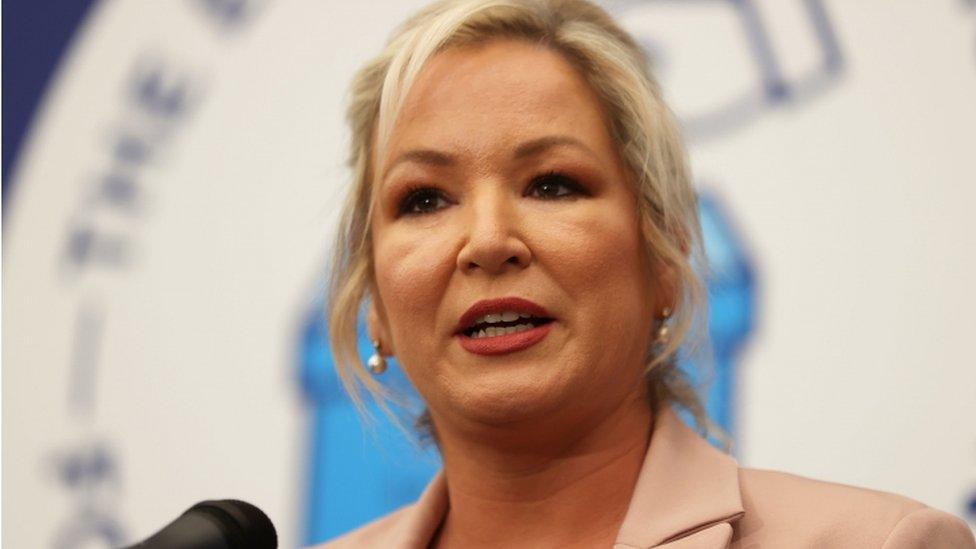NI Troubles: Michelle O'Neill welcomes US letter opposing legacy bill
- Published

The Troubles was a period of conflict which lasted for 30 years and cost the lives of more than 3,500 people
A letter sent by US Congress members expressing "grave concern" about the UK government's Troubles legacy plans is a "significant intervention", Sinn Féin's Michelle O'Neill has said.
The letter, external, sent to Prime Minister Rishi Sunak on Friday, was signed by 27 members of the US Congress.
In it they described the legislation as "dangerous".
It "directly and unilaterally impacts the peace and stability across the island of Ireland," they added.
The controversial Troubles legacy bill, which introduces conditional amnesties, is on course to pass into law before summer.
The bill would end all future civil actions related to the conflict and there would be no further inquests beyond those already commenced.
The proposals have been opposed by the main political parties in Northern Ireland, the Irish government and victims' groups.
Ms O'Neill, her party's vice-president, said the letter is "a significant intervention which must not be ignored".
The bipartisan Congress letter said: "We write with grave concern over your government's decision to continue advancing the Northern Ireland Troubles (Legacy and Reconciliation) Bill which denies justice, suppresses the will of the people of Northern Ireland, and conceals the truth of the past.
"Amid this time of war and unrest on the continent, we are concerned that this legislation would undermine the Belfast / Good Friday Agreement, the bedrock of peace in Northern Ireland."
Citing the upcoming 25th anniversary of the agreement, the Congress members say they "strongly urge" the prime minister to "return to values agreed upon" in it.
Ms O'Neill said: "There is deep frustration that the British government's legacy bill which will halt in law the rights of all victims to access truth, justice and accountability is not being heard by the British government.
"The criticism of the Bill, both domestically and internationally, has been widespread and consistent. This bipartisan letter from members of Congress directed to Rishi Sunak is a significant intervention which must not be ignored."

Michelle O'Neill said the letter was a "significant intervention"
A UK Government spokesperson said: "We have tabled a number of proposed amendments to the bill which seek to address key concerns that have been raised by many stakeholders, including victims and survivors.
"These amendments reflect the extensive engagement that has taken place, and demonstrates the government's commitment to working with all interested parties regarding their concerns, and how these might be addressed."

What is the legacy bill?
Legislation that aims to draw a line under the Northern Ireland Troubles by dealing with so-called legacy issues
The Northern Ireland Troubles (Legacy and Reconciliation) Bill runs to almost 100 pages
It was introduced in May in an attempt to deal with more than 1,000 unsolved killings
A central element involves immunity from prosecution for those who co-operate with investigations run by a new information recovery body
Victims' groups and political parties at Stormont are opposed to the bill, arguing it will remove access to justice for victims and their families
Veterans Commissioner Danny Kinahan gave the bill a cautious welcome and it is also supported by the Northern Ireland Veterans Movement
The Bill had its second reading in the Lords on 23 November. The government told peers it would bring forward amendments including "a more robust process" around immunity from prosecution
Lord Caine of the Northern Ireland Office (NIO) said the Independent Commission for Reconciliation and Information Recovery (ICRIR) would be able to conduct criminal investigations
He said he would be "very, very surprised" if he does not table more amendments to the bill.

Related topics
- Published3 January 2023

- Published16 December 2022

- Published3 April 2023
